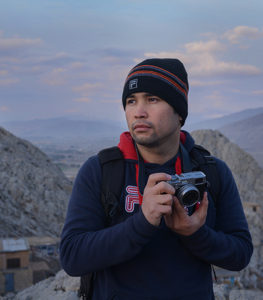Four decades of exile
As talks in the Pakistani capital Islamabad get underway on the future of almost five million Afghan refugees, Afghan-Hazara refugee and award winning photo-journalist Barat Ali Batoor reflects on his peoples’ four decades of exile.
It has been 40 years since the Soviet invasion in Afghanistan.
The invasion was followed by unrest and turmoil in the country which forced many more people to leave. Since then Pakistan has generously hosted Afghani refugees.
 Almost four generations of Afghani refugees have known Pakistan as their home and many have never visited their homeland due to the ongoing insecurity.
Almost four generations of Afghani refugees have known Pakistan as their home and many have never visited their homeland due to the ongoing insecurity.
I was born and grew up in Pakistan in a family who fled Afghanistan because of the ongoing persecution of, and discrimination against, my people the Hazaras.
Like most things in life, living in Pakistan as refugees had its good and bad sides. But I must say that Pakistan has been extremely generous country to the Afghani refugees.
I must say that refugees have enjoyed peace and security more than their home country at in the first two decades of their displacement.
Our people the Hazaras mostly settled in the capital of Balochistan province, Quetta.
The city was home to the Hazaras who escaped persecution during the rule of King Abdul Rahman, who killed almost 63 per cent of the Hazara population, built a minaret with the skulls of our compatriots and occupied our lands.
Those who settled in Quetta enjoyed the same rights as any other Pakistani citizens and prospered in different fields of life. The local people welcomed the newly arrived refugees warmly and with open hearts. This is how Quetta became a safe haven for the Hazaras.
It took no time for the Hazara refugees to thrive economically and to make contributions to the economy of the city.
I remember Hazaras in the late 80s and 90s were running major businesses in the city; and the traditional shoes made by the skilled shoe makers were exported all over the country.
The Hazara community enjoyed economic growth, peace and any other opportunities that came along until the late 1990s or early 2000s.
As the global political landscape changed and the US invaded Afghanistan, these geopolitical shifts were also felt by the Hazaras in Quetta.
The city which had been a safe haven turned into a bloody killing ground when my peole became the target of religious militants.
Our community was confined into two small areas. The members of our community had to leave their businesses, education, and employment as they were being targeted anywhere outside of their ghettos.
The Hazara community lost around 2000 of its members in different targeted killings and suicide attacks and thousands more were injured or permanently disabled.
The insecurity in Quetta forced many Hazaras to flee the homes they had built there but many remained there for various reasons.
Overall, Pakistan has been not less than a haven to the Hazaras. We shall always be thankful the country and its people always for their generosity and love.
As the peace talks continue between the US and the Taliban, the people of Afghanistan strongly desire a long lasting peace and stability. But considering the ideology the Taliban have displayed carries and what they have done in the past, I’m not very optimistic about peace in Afghanistan in the near future. But as an old proverb says, ‘the ox is slow but the earth is patient’. We can only hope for the best.












